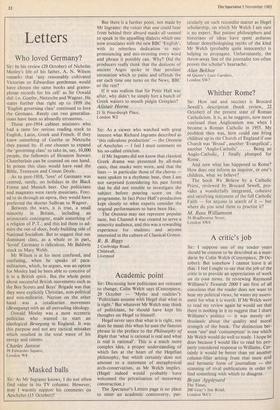Letters
Who loved Germany?
Sir: In his review (29 October) of Nicholas Mosley's life of his father, A. N. Wilson remarks that 'any reasonably cultivated Victorian or Edwardian gentleman would have chosen the same books and gramo- phone records for his cell' as Sir Oswald did: i.e. Goethe, Nietzsche and Wagner. He states further that right up to 1939 the `English governing class' continued to love the Germans. Rarely can two generalisa- tions have been so absurdly erroneous.
Those pre-1914 cabinet ministers who had a taste for serious reading stuck to English, Latin, Greek and French. If they knew something of Goethe or Nietzsche they passed by. If one chooses to expand I he 'governing class' to take in, say, 10,000 people, the followers of Houston Stewart Chamberlain can be counted on one hand. In prison this class would have read the Bible, Tennyson and Conan Doyle.
As to post-1918, 'love' of Germany was centred, surely, on holidays in the Black Forest and Munich beer. Our politicians and magnates were rarely musicians. Forc- ed to sit through an opera, they would have preferred the shorter Sullivan to Wagner.
Between the wars, it is true, a small minority in Britain, including an aristocratic contingent, made something of a religion of P.T.; and this led them to ad- mire the out-of-door, body-building side of National Socialism. But to suggest that our dominant class, as a whole or in part, 'loved' Germany is ridiculous. Mr Baldwin stuck to Mary Webb.
Mr Wilson is at his most confused, and confusing, when he speaks of para- militarism, which, he argues, was an option for Mosley had he been able to conceive of it in a British spirit. But the whole point about successful British movements such as the Boy Scouts and Boys' Brigade was that they were explicitly Christian, non-political and non-militarist. Nazism on the other hand was a totalitarian movement (Bewegung) with an all-pervading ideology.
Oswald Mosley was a most eccentric politician who wanted to start an ideological Bewegung in England. It was this purpose and not any tactical mistakes which resulted in the total waste of his energy and talents.
Charles Janson
39 Edwardes Square, London W8














































 Previous page
Previous page